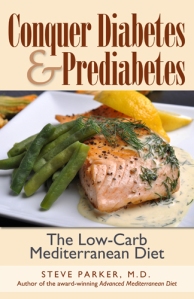![MPj04427760000[1]](https://diabeticmediterraneandiet.com/wp-content/uploads/2010/04/mpj044277600001.jpg?w=200&h=300) Dieters with particular genetic make-up respond better or worse to specific types of weight-loss diets, suggest researchers who presented data at the 2010 Cardiovascular Disease Epidemiology and Prevention /Nutrition, Physical Activity, and Metabolism conference. Findings are preliminary, but may explain the common phenomenon of two people going on the same diet, but only one achieving good results.
Dieters with particular genetic make-up respond better or worse to specific types of weight-loss diets, suggest researchers who presented data at the 2010 Cardiovascular Disease Epidemiology and Prevention /Nutrition, Physical Activity, and Metabolism conference. Findings are preliminary, but may explain the common phenomenon of two people going on the same diet, but only one achieving good results.
I’ll bet you can imagine several other explanations.
Several years ago, the “A to Z” study compared the weight loss of 311 overweight women on one of four diets: Atkins (low-carb), Ornish (very low fat, vegetarian), Learn (low-fat), and Zone (moderate carb restriction, high protein, moderate fat). Atkins was a bit better than the other diets, in terms of long-term (one year) weight loss. But within each diet group, some women lost 40–50 pounds (18–23 kg), whereas others gained over 10 pounds (4.5 kg).
Stanford University researchers obtained DNA from 138 of the 311 women and noted the occurence of three genes—ABP2, ADRB2, and PPAR-gamma—that had previously been shown to predict weight loss via diet-gene interactions. For example, a particular mix of these genes predict better weight loss with a low-fat diet; a different mix predicts more loss with a low-carb diet.
Women who had been randomly assigned to one of the A to Z diets tended to lose much more weight if they happened to have the gene mix appropriate for that diet (compared to those on the same diet with the wrong gene mix). The difference, for example, might be loss of 12 pounds versus two pounds.
The lead researcher, Dr. Mindy P. Nelson, told TheHeart.Org that the proportion in the general population genetically predisposed to the low-fat versus low-carb approach is about 50:50.
Take-Home Points
These results, again, are preliminary; additional testing is necessary for confirmation. If they had been able to test the DNA of the other 178 women in the A to Z study, the results could have been either stronger or shown no diet-gene interaction. The study hasn’t even been published in a peer-reviewed journal yet.
Men may or may not be subject to similar diet-gene interaction.
If a genetic test is ever clinically available to tell a dieter which type of weight-loss diet would be more successful, it will likely be cheaper to just try a particular diet first and see if it works over 4–6 weeks. Successful long-term weight loss is like smoking cessation—most smokers try 5–7 different times or methods before hitting on one that works for them.
This potential diet-gene interaction could be a major finding that will stop the arguing about which is the single best way to lose excess fat. Many paths may lead to the mountaintop.
Reference: O’Riordan, Michael. Dieting by DNA? Popular diets work best by genotype, reseach shows. HeartWire by TheHeart.Org, March 8, 2010.



Hmm. The study as reported by the genetics showed that the difference on average was only 2.5x, not 6. See http://www.inherenthealth.com/our-tests/weight-management/clinical-study.aspx
Me, I’m a geek, so I went ahead and ordered this. Sent it in a week or so ago, still waiting for results. I’ll be writing it up for the blog when I get them.
Now that is interesting, Beth! I didn’t know the genetic test was commercially available already: $149 USD. Swab the inside of your cheek just like CSI Miami, and mail it in.
The “fer instance” numbers I got were from TheHeart.Org article, which also said, “Women assigned to a genotype-appropriate diet lost 5.3% of their body weight compared with just 2.3% among those not matched to genotype (p=0.005).”
I was estimating the cost closer to $500-1,000.
I have no opinion whether the test is helpful or not.
-Steve
So – who’se disposed to a high(er) fat Cretan style diet then? 50 / 50 low fat / low carb doesn’t leave much room! 🙂
Although I suppose the low carb is the closest. Cretan had greater carb than (say) Atkins (in lieu of less protein), but still considered a moderate carb intake. Fat intake of up to 40% would be in line with low carbers.
Steve
Oz
Hi, Steve
You probably know more that I do about the Cretan diet specifically. Regarding the traditional “Mediterranean diet,” I’ve always considered it to be a balanced macronutrient diet: 35-40% fat calories, 15-18% protein calories, and the rest (about 55%) from carbohydrates. So the available genetic test may not be helpful in selection.
-Steve
This is probably seen as ridiculously simple minded, but what strikes me, from the old 7 countries thang:
could it be that Asian blooded people might do better on a lower fat diet, and Euro type people do better on a med. type diet?
But what of other cultures, etc?
No, Steve, I think you’re on to something there. I would just add that the traditional cultures that avoid obesity despite high-carb intake are probably not eating highly processed, refined carbs.
-Steve